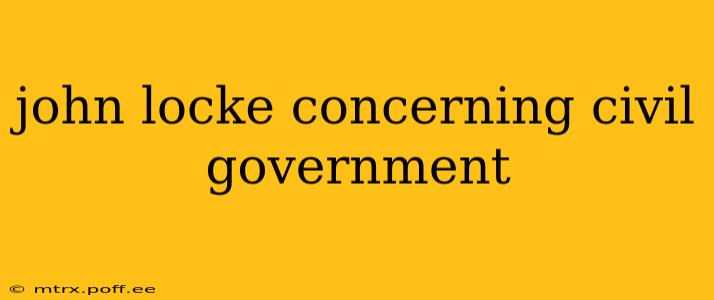John Locke's Two Treatises of Government, particularly the Second Treatise, stands as a cornerstone of modern political philosophy. Published anonymously in 1689, it profoundly impacted the development of liberal thought, influencing revolutions and shaping constitutional governments worldwide. Locke's treatise argues for natural rights, limited government, and the social contract, concepts that remain central to political discourse today. This exploration delves into the core tenets of Locke's work, addressing key questions frequently asked about this influential text.
What are the main arguments of Locke's Two Treatises of Government?
Locke's Second Treatise centers on refuting the divine right of kings, a prevalent belief that monarchs derived their authority directly from God. Instead, Locke posits that government derives its legitimacy from the consent of the governed. He argues that individuals possess inherent natural rights—life, liberty, and property—that precede the existence of government. These rights are not granted by any ruler but are inherent to human beings.
To protect these natural rights, individuals enter into a social contract, agreeing to form a government that will uphold their liberties. This government, however, is not absolute; it is limited by the very contract that created it. If the government fails to protect the people's rights or acts tyrannically, the people have the right to alter or abolish it. This concept of popular sovereignty, the ultimate authority residing in the people, is revolutionary and a direct challenge to the absolutist regimes of his time.
What is Locke's concept of the state of nature?
Locke describes the state of nature as a pre-political condition where individuals are governed by natural law. This isn't a state of war, as some might assume, but a state of freedom where individuals are equal and possess the right to self-preservation and their property. The law of nature dictates that no one should harm another in their life, liberty, or possessions. However, the state of nature lacks an impartial judge and enforcer, leading to potential conflicts and the need for a civil government.
What is Locke's theory of property?
Locke's theory of property is intricately linked to his concept of natural rights. He argues that individuals acquire property through their labor. By mixing their labor with natural resources, they transform those resources into private property. This right to property, however, is not absolute; it is limited by the proviso that "enough, and as good," be left for others. This means that one cannot acquire so much property as to leave others without the means of sustenance. This aspect of Locke's theory has been subject to significant debate and interpretation.
How does Locke justify revolution?
Locke justifies revolution as a last resort when the government consistently violates the natural rights of its citizens. If the government becomes tyrannical, acting against the very principles of the social contract, the people have a right—indeed, a duty—to resist and overthrow it. This right to revolution isn't a call for frequent rebellion but rather a safeguard against absolute power. It emphasizes the importance of limited government and the responsibility of rulers to uphold the rights of the governed.
What is the significance of Locke's ideas in the American Revolution?
Locke's ideas profoundly influenced the American Revolution and the drafting of the American Declaration of Independence. The Declaration's emphasis on natural rights, including "life, liberty, and the pursuit of happiness," directly reflects Locke's influence. The concept of popular sovereignty and the right to overthrow a tyrannical government are also central themes in both Locke's work and the American revolutionary movement. The framers of the United States Constitution drew heavily upon Locke's political philosophy, shaping a government based on limited power, checks and balances, and the protection of individual liberties.
What are the criticisms of Locke's philosophy?
While immensely influential, Locke's philosophy has faced criticism. Some argue that his theory of property is inherently unequal, potentially justifying exploitation and inequality. Others question the practicality of his concept of the social contract, arguing that consent is often tacit or coerced, not freely given. Additionally, critics point to the potential for ambiguity in determining when a government has become tyrannical enough to justify revolution. Despite these criticisms, Locke's Two Treatises remains a seminal work, continuing to provoke debate and shape political thought.
This exploration provides a comprehensive overview of John Locke's Concerning Civil Government. His enduring legacy lies not just in his detailed arguments, but in the ongoing conversations they spark about the nature of government, individual rights, and the crucial relationship between the governed and those who govern.
